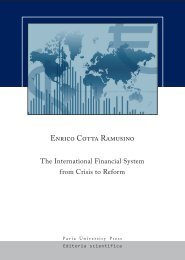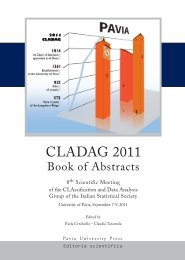The Palestinian Economy. Theoretical and Practical Challenges
The Palestinian Economy. Theoretical and Practical Challenges
The Palestinian Economy. Theoretical and Practical Challenges
You also want an ePaper? Increase the reach of your titles
YUMPU automatically turns print PDFs into web optimized ePapers that Google loves.
250<br />
Zagha<br />
drawbacks in the political <strong>and</strong> legislative processes of centralised systems that may<br />
induce inequity, uncertainty, or excessive public spending.<br />
In Tommasi <strong>and</strong> Weinschelbaum (1999), the advantages of centralised decision<br />
making (internalisation of externalities) are compared to those of decentralised decision<br />
making (increased control of agents by the citizens through lower information<br />
asymmetries, less free-riding <strong>and</strong> easier coordination). In addition, decentralisation may<br />
have the advantage of encouraging competition if citizens “vote with their feet” (Tiebout<br />
1956).<br />
Oates in his Fiscal Federalism (1972, p.13) summarises the economic desirable<br />
characteristics a decentralised public sector possesses.<br />
First, it provides a means by which the levels of consumption of some public goods can<br />
be tailored to the preferences of subsets of the society. In this way, economic efficiency<br />
is enhanced by providing an allocation of resources that is more responsive to the tastes<br />
of consumers. Second, by promoting increased innovations over time <strong>and</strong> by providing<br />
competitive pressures to induce local governments to adopt the most efficient<br />
techniques of production, decentralization may increase both static <strong>and</strong> dynamic<br />
efficiency in the production of public goods. Third, a system of local government may<br />
provide an institutional setting that promotes better public decision-making by<br />
compelling a more explicit recognition of the costs of public programs.<br />
Oates concludes (1972, p.19) that mix of centralised <strong>and</strong> decentralised forms of the<br />
government is the central theoretical problem of the subject of fiscal federalism, or in his<br />
own words “This [...] is the central theoretical problem of the subject of fiscal federalism:<br />
the determination of the optimal structure of the public sector in terms of the assignment<br />
of decision-making responsibility for specified functions to representatives of the<br />
interests of the proper geographical subsets of the society.” In the final analysis of this<br />
issue the selection of the proper level of government to provide a particular good or<br />
service is not an easy problem; there are typically a number of variables that figure in this<br />
decision, <strong>and</strong> in most instances, some form of trade off between welfare gains <strong>and</strong> losses<br />
is involved.<br />
<strong>The</strong> principle of subsidiarity suggests that economic performances of the<br />
governments will be more responsive to consumer dem<strong>and</strong>s <strong>and</strong> to cost cutting<br />
pressures (i.e. more efficient) if services are provided by the lowest level of government<br />
possible. While foreign policy, defence, immigration, <strong>and</strong> international trade can be
















